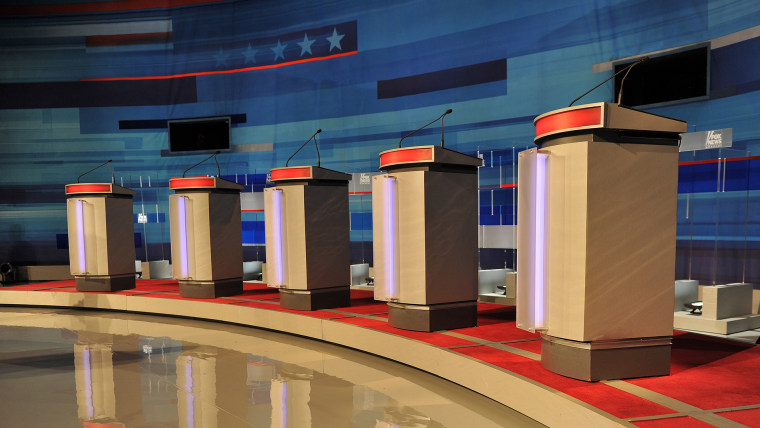The first presidential debate featuring Hillary Clinton and Donald Trump is scheduled for Monday night, which means assorted partisans are hard at work, furiously trying to shape public perceptions ahead of the big showdown.There are three broad angles to this that are worth keeping in mind between now and showtime.1. Donald Trump is terrified of real-time fact-checking.Republicans are still angry with CNN's Candy Crowley fact-checking Mitt Romney during a debate four years ago, and Donald Trump spent some time this week lobbying NBC News' Lester Holt, among other moderators, to let the candidates argue among themselves."You're debating somebody, and if she makes a mistake, or if I make a mistake, we'll take each other on," Trump said during one of his several Fox News appearances this week. He added that he and Clinton should simply "argue it out."It's bound to be tricky. If a moderator, such as Crowley, provides the public with information that contradicts a candidate, he or she is the target of intense criticism. Note, however, that NBC News' Matt Lauer also faced equally intense rebukes recently for hosting an event in which he let some brazen Donald Trump lies go without pushback.Trump clearly prefers the latter, creating a "he said, she said" dynamic in which viewers aren't sure who to believe. Whether Holt and other moderators stick to that model remains to be seen.2. The expectations game is getting ridiculous.I wrote a piece a few weeks ago about the campaigns going to borderline silly lengths to set expectations ahead of the debate -- "Our candidate is going to do terribly, and our rival will be amazing" -- and the problem has only intensified. The New York Times reported today:
Mr. Trump is largely shunning traditional debate preparations, but has been watching video of Mrs. Clinton's best and worst debate moments, looking for her vulnerabilities. [...]Mr. Trump ... is approaching the debate like a Big Man on Campus who thinks his last-minute term paper will be dazzling simply because he wrote it. He has paid only cursory attention to briefing materials. He has refused to use lecterns in mock debate sessions despite the urging of his advisers. He prefers spitballing ideas with his team rather than honing them into crisp, two-minute answers.
The Associated Press has a similar report today. Take both with many grains of salt.Look, this isn't complicated: it's in the Trump campaign's interests to tell reporters that Trump isn't going to be well prepared, hasn't taken coaching seriously, and isn't approaching the process with any real seriousness. That doesn't mean it's true.We already know the Republican nominee has had training sessions with aides -- including, by some accounts, former Fox chief Roger Ailes, who knows a thing or two about effective television -- and to buy the spin that Trump aides are deeply concerned is to ignore the larger game that's being played.3. The media is already setting the bar too low for Trump.Donald Trump has certainly earned his reputation for offensive antics and routine buffoonery, but this has created a dynamic in which the media will declare him the winner if he manages to go the entire debate without mooning Clinton and the audience.Fox's Charles Krauthammer recently said that if Trump "just shows up not foaming at the mouth ... he wins automatically."The problem, of course, is that it's crazy to evaluate a presidential candidate on that kind of curve. Instead of holding Trump to a high standard -- expecting him to be honest, well informed on a wide variety of issues, etc. -- Americans are being told Trump "wins" if he avoids making racial slurs and drooling on himself.The Washington Post's Greg Sargent has some good advice for observers: "[T]hese 'expectations' are arbitrary, and they are set by the commentators themselves. Trump should not be accorded credit for being less ignorant, unhinged, hateful, and dishonest than usual."
